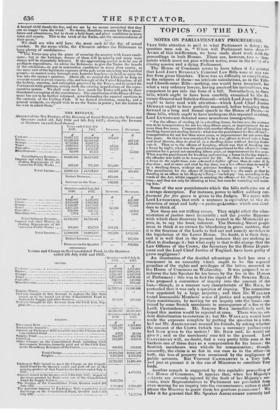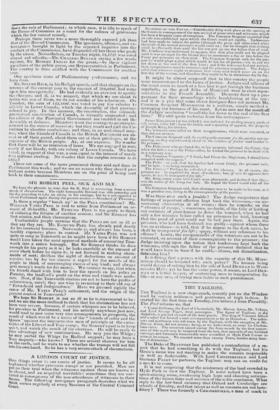TOPICS OF THE DAY.
NOTES ON PARLIAMENTARY PROCEEDINGS.
VERY little attention is paid to what Parliament is doing ; question men ask is, " When will Parliament have done .Aware of this indifference, we have made short work with the proceedings in both Houses. There are, however, two cr,- three points which must not pass without notice, even in the hurry of a closing session and a dying Parliament. The House of Commons seems to have taken it for granted that Lord JOHN RUSSELL'S Criminal Law Bills were at any rate free from gross blunders. There was no difficulty or complication in the subjects of them-no intricate calculations, as in the Tithe and Church-rates Bills-nothing, one would have imagined, but what a very ordinary lawyer, having received his instrnctions, was competent to put into the form of a bill. Nevertheless, in these bills, which ought to have been carefully examined by the At. . torney-General and Solicitor-General-which Lord JOHN RUSSELL I!: ought to have read with attention-which Lord Chief Justice PENMAN ought to have perfectly mastered. before bringing them forward in a long and formal speech in the House of Peers,-in these bills, which ought to have undergone this repeated scrutiny, Lord 1.1mm-wan detected some monstrous incongruities.
" For the offence of stealing Si. in a dwelling-house, for instance, the sentence was to be transportation for not less than fifteen years, or imprisonment for not more than five years. Compare this with another offence, that of breaking into a dwelling-house and stealing therein : what was the punishment for this offence?- transportation for not less than seven years, or imprisonment for not more than four years. So that it was considered to be a less offence to break into a house and steal therein, than to steal 31. in a dwelling-house without haring broken into it. Then as to the offence of burglary, which was that of breaking into a house by night, what was the punishment apportioned to this offence ?-trans- portation for a period not exceeding fifteen years. or imprisonment for five years. What was the punishment for breaking and entering a house in the day-time ?- the offender was liable to be transported for life. So that, to break and enter a house in the night-time, was e.sieemed a lighter offence than to enter it by day-time ; and to enter and steal by day. time, was a less offence than to steal 51. in a dwelling.howie, without any previous breaking or entering. • • The punishment for the offence of stealing a lamb was the same as that for shooting at an officer in his Majesty's Navy-' on full pay ' too, according to the words of the Act, whilst engaged in assisting the officers of his 31ajesty's Cus- toms-and that not only for shooting at him, but even for wounding and maim. ing him."
Some of the new punishments which the bills authorize are of a savage description. For instance, power to inflict solitary eon. finement for five years is given to the Judges. We agree with Lord LYNDHURST, that such a sentence is equivalent to the de- struction of mind and body-a prolonged.torture which one shud- ders to think of.
Now these are not trifling errors. They might affect the athni- nistration of justice most materially ; and the jocular flippancy with which their discovery has been treated in the Ministerial pa- pers, is, to say the least, indecent. The Downing Street people seem to think it an excuse for blundering in grave matters, that it is the function of the Lords to find out and remedy mistakes in the legislation of the Lower house. No doubt, it is their duty; and it is well that in the present instance they are making an effort to discharge it; but what reply is that to the charge that the Law Officers of the Crown, the Secretary for the Home Depart- ment and the Lord Chief Justice of England, have been guilty of gross negligence?
An illustration of the decided advantage a lord has over a commoner in an assembly which ought to be the especial guardian of the rights and privileges of the latter, occurred in the House of Commons on Wednesday. It was proposed to re- imburse the late Speaker for his losses by the lire in the Houses of Parliament : this was in fact the object of Mr. SPRING Rica, who proposed a committee of inquiry into the amount of' the loss,-though, in a manner very characteristic of Mr. RICE, he pretended that it was only a question of inquiry. The committee was appointed by a large majority ; and then Mr. WALLACE
tested honourable Members' sense of justice and sympathy with i . their constituents, by moving for an inquiry into the losses sus-
tained by some Scotch merchants in consequence of a fire at the Leith Customhouse. Mr. SPRING RICE immediately said, he hoped this motion would be rejected at once. There was an evi. dent disinclination to entertain it; but Mr. WALLACE would have made the exposure complete by putting the question to a vote, had not Mr. ABERCROMBY rescued his friends, by asking whether the consent of the Crown (which was a necessary preliminary) had been given to the motion ? Mr. RICE said, he would not give it ; arid so the merchants' case fell to the ground. Lord CANTERBURY will, no doubt, find a very pretty little Sum at his bankers one of these days as a compensation for his losses: the Scottish merchants may whistle for compensation ; though. , assuredly, the claim is as fair in one case as in the other-m both, the loss of property was occasioned by the negligence of public servants. But Viscount CANTERBURY IS a Tory lord, and just at present it is the cue of Ministers to conciliate Tory lords. Another remark is suggested by this equitable proceeding of the House of Commons. It appears that, when her Majesty's subjects are severely injured by the fault of her Majesty's ser- vants, their Representatives in Parliament are precluded from even moving for an inquiry into the circumstances, unless it shall please the Minister to grant them his gracious permission ! We take it for granted that Mr. Speaker ABERCROMBY correctly laid
down the rule of Parliament ; in which case, it is idle to speak of the House of Commons as a court for the redress of grievances which the law cannot remedy. • :„ Perhaps there never was a more thoroughly exposed job than that of the Record Commission. The ignorance, idleness, and ex- travagance brought to light by the repeated inquiries into the conduct of the Commission, have disgusted all but those who profit by the abuse. Nevertheless, on Tuesday night, 18,172/. was voted
almost sub si/entio,—Mr. CHARLES BULLER saying a few words against, Sir ROBERT INGLIS for the grant,—by those vigilant guardians of the public purse, our Representatives in Parliatnent. The country is thus saddled with the Commission for another year.
One specimen more of Parliamentary performances, and we have done.
Mr. SPRING RICE, in his Budget speech, said that charges on the revenue of the current year to the amount of 300,000/. had come upon him unexpectedly. He bad evidently an aversion to specify the charges; and if, as we suspect, that which we are about to notice was one of them, we do not wonder at his reluctance. On Tuesday, the sum of 14,1601. was voted to pay the salaries to ofileials in Lower Canada, which the Assembly of that province refused to pay. In this manner, the constitution, the solemnly guaranteed constitution of Canada, is virtually suspended ; and the (glitters of the Provincial Government are enabled to set the Assembly at defiance. Ministers want the courage to go straight- forward in the course of coercion ; but they insult and gall the Ca- nadians by abortive resolutions; and then, in an underhand man- ner, when the friends of Canada in the British Parliament are ab- sent or off their guard, cheat them out of their privileges, at the expense of the British people. Ay, at our expense. No wonder that there will be no remission of taxes. We are engaged in war, costly if not bloody, with our colony of Lower Canada. We have voted, in support of that war, a sum equal to the interest of nearly null millions sterling. No woader that the surplus revenue is so little!
These are some of the more prominent things said and done in Parliatnent this week ; and we see no reason why they should pass without notice because Members are on the point of being sent back to their constituents.



























 Previous page
Previous page